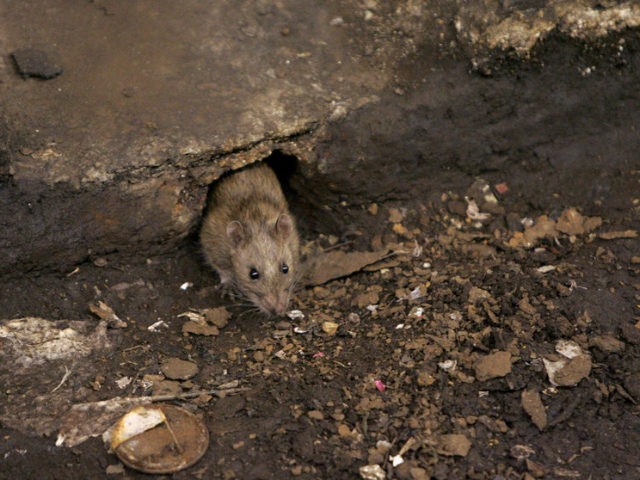Man-made climate change is causing increased “rat fecundity,” an essay warns, which, in turn, threatens to escalate into a full-blown “rat explosion.”
“As the climate warms, rats in New York, Philadelphia and Boston are breeding faster — and experts warn of a population explosion,” writes Faye Flam for Bloomberg.
Ms. Flam writes that people are not frightened enough of abstract notions like rising temperatures, so threats of “infestations and outbreaks” are necessary to scare them into action against climate change.
According to “rat expert” Bobby Corrigan of Purdue University, rats have a gestation period of just 21 days, and young rats can start reproducing a month after they are born. “That means that in one year, one pregnant rat can result in 15,000 to 18,000 new rats,” Flam writes.
“Warmer winters will continue to dial up rat fecundity,” Flam declares. “People in urban areas such as New York and Boston are already noticing a lot more rats, not just in downtown alleyways, but even in the posh suburbs.”
As usual with this sort of climate change alarmist literature, the argument circles back to the Paris Climate Accord and its goal of keeping global temperature increases to 1.5 degrees Celsius.
“Many living things are sensitive to small changes in temperature, so warming of 2 degrees Celsius will transform the flora and fauna that surround us in a big way,” Flam writes. “Other life forms are also very sensitive to moisture, and so populations will crash or explode as anthropogenic climate change continues to make wet areas more sodden and dry areas, more parched.”
Ms. Flam hopes that a common fear of rat infestation will unite conservatives and liberals in the fight against climate change.
While “different people fear different things depending on their upbringing, education and surroundings,” she writes, we are all “sharing this warming planet, and at the very least surely we can unite against a future filled with rats.”
The impending rat explosion is just the latest in a long list of dire consequences that will reportedly befall humanity as a result of anthropogenic climate change.
In November 2016, online journal Business Insider ran a scare piece titled “7 foods that could go extinct thanks to climate change,” which threatened that global warming is “endangering some of the most popular and delicious foods on the planet.”
“Here are seven foods and drinks that could grow more expensive and eventually disappear due to climate change,” the essay confidently announced: avocados, coffee, beer, oysters, maple syrup, chocolate, and lobsters.
In 2017, the U.K.’s climate flagship newspaper, the Guardian, similarly warned that ten species are on the verge of extinction because of man-made climate change.
We can say “good-bye” to Hawaiian honeycreepers, Bramble Cay melomys, and sea turtles, the Guardian warned, thanks to “the destructiveness of our species.”
The Guardian had already declared that climate change is a “racist” issue, and Canada’s minister of Environment and Climate Change urged environmental activists to address the “gendered impacts” of climate change, especially its effects on women and girls.
Climate change is, in fact, connected to an array of issues spanning from transgender justice to immigration reform, according to environmental activist Leehi Yona.
“Climate change isn’t just about the planet. It’s about justice: racial, social, socioeconomic, reproductive, and environmental,” Ms. Yona wrote in the Nation. “It’s about immigration reform, LGBTQIA+ rights, and religious freedom.”
“I find myself unable to think of climate change on its own,” Yona said.
One thing seems clear. Nowhere does the “politics of fear” enjoy such reckless abandon as in the area of climate change.
Follow Thomas D. Williams on Twitter Follow @tdwilliamsrome

COMMENTS
Please let us know if you're having issues with commenting.